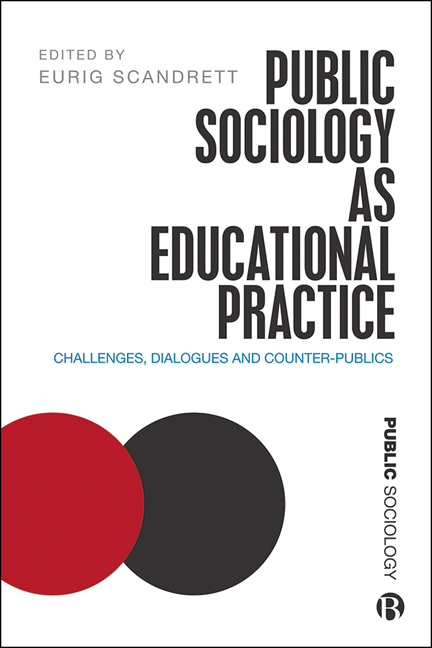II.7 - Dialogue II: ‘Really Useful’ Public Sociology Knowledge
Published online by Cambridge University Press: 02 March 2021
Summary
This dialogue includes an engagement between the author and two of the case contributors, both of whom are operating at the boundaries of policy sociology. Whilst this has perhaps underrepresented those working in other spheres of knowledge co-production – research, art, behaviour – it has allowed a focus on the kinds of knowledge that find their ways into the process of policy development and, more generally, what knowledge is valued in the public sphere.
The section starts with Jan Law's case study of a particular practice of sociology, driven by the needs of policy. Policy formation and implementation, with its associated discourses of politics, influence, interests and media narrative, constitutes an important public sphere in which public sociology might occur, as well as a branch of sociology with the particular combination (according to Burawoy's (2005) categorisation) of instrumental knowledge aimed at an extraacademic audience. Jan's experience of the challenge to the academic integrity of the sociologist in this context, especially from sponsor capture, leads her to ‘cross the quadrant’ towards public sociology. The key issue that this policy-to-public sociology raises is not so much sociological practice as knowledge – who is able to control the knowledge generated by sociological practices. By contrast, Laura Lovin's experience of policy sociology accounts for a context in which that challenge has been met, relatively successfully, by the integration of the knowledge contribution of refugee and asylum-seeking women into a gendered and racialised policy discourse which otherwise seeks to devalue that knowledge. The combination of a conducive policy context (the Scottish Government's ‘New Scots’ integration strategy) and implementation by NGOs sensitive to dialogical practice within ‘invited participation’ (Cornwall, 2002) has achieved a degree of affirmation of the knowledge contribution of refugee women. This is an unfinished and ongoing project and, as Laura acknowledges, constitutes ‘first steps toward policy change’, unlike in Jan's case where she encountered fierce resistance to policy change from clients with vested interests in existing sexual health policy. The contrast between these cases may suggest a dynamism in the relationship between policy and public sociology, contingent on power relations and appetite for policy change amongst key stakeholders, requiring sociologists to cross back and forth across Burawoy's quadrants in response to political opportunities and challenges.
- Type
- Chapter
- Information
- Public Sociology as Educational PracticeChallenges, Dialogues and Counter-Publics, pp. 217 - 224Publisher: Bristol University PressPrint publication year: 2020



